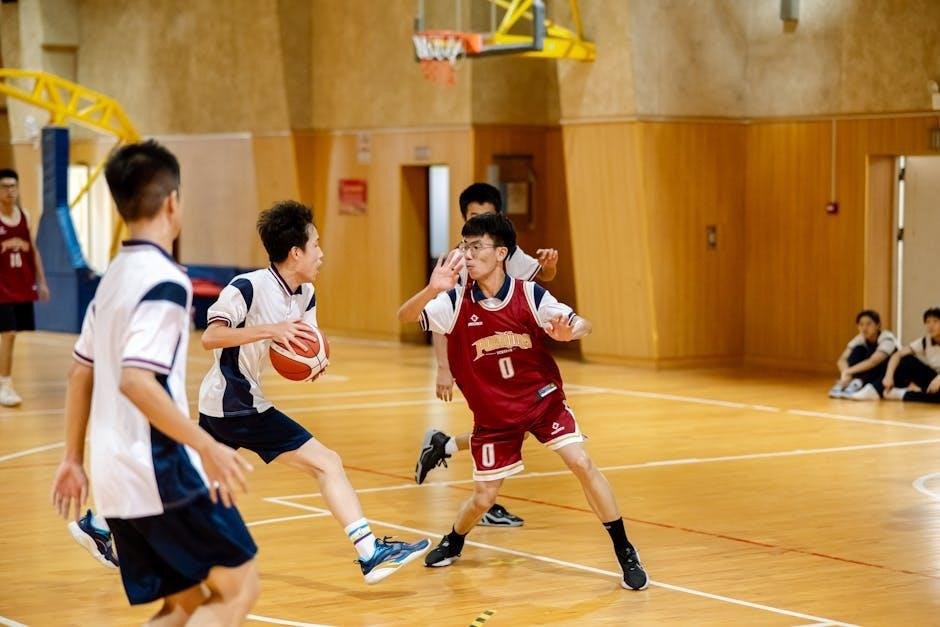Sport and Exercise Psychology is the scientific study of psychological factors in sports, exercise, and physical activity. It examines how psychological techniques enhance performance and mental well-being. Sport psychologists work with athletes, teams, and individuals to optimize mental performance and overall health. Understanding psychological aspects is crucial for peak performance and satisfaction in sports.
1.1 Definition and Scope of Sport and Exercise Psychology
Sport and Exercise Psychology is a multidisciplinary field studying mental and emotional factors influencing sports, physical activity, and exercise. It focuses on enhancing performance, mental well-being, and overall satisfaction in athletic pursuits. The scope includes understanding motivation, personality traits, and psychological techniques to optimize physical and mental health. Sport psychologists work with athletes, teams, and individuals to address challenges like stress, anxiety, and performance pressure. This field integrates principles from psychology, physiology, and sociology to create tailored interventions. Its applications range from elite sports to recreational exercise, making it vital for improving human performance and quality of life through evidence-based practices.
1.2 Historical Development of Sport and Exercise Psychology
Sport and Exercise Psychology emerged as a distinct field in the late 19th and early 20th centuries, influenced by early psychological studies on physical performance. Coleman Roberts Griffith is often credited with pioneering the field in the 1920s through his work on athletic performance and psychological assessments. The post-World War II era saw formalization, with the establishment of organizations like the North American Society for the Psychology of Sport and Physical Activity (NASPSPA) in 1967 and the International Society of Sport Psychology (ISSP) in 1965. These organizations advanced research and professional practices, defining the field’s scope. Today, Sport and Exercise Psychology integrates theoretical and applied approaches, addressing athlete mental health, performance optimization, and physical activity promotion across diverse populations.
1.3 Importance of Sport and Exercise Psychology in Modern Sports
Sport and Exercise Psychology plays a crucial role in modern sports by enhancing mental well-being and optimizing performance; It addresses psychological factors like motivation, stress, and confidence, enabling athletes to achieve peak performance. Sport psychologists help athletes develop coping strategies, set realistic goals, and maintain resilience. Additionally, they foster teamwork and communication within teams. The field also promotes physical activity adherence among the general population, contributing to public health. By addressing mental health issues and providing performance-enhancing techniques, Sport and Exercise Psychology is essential for both elite athletes and individuals engaging in regular exercise, ensuring holistic development and success in sports.

Theoretical Foundations of Sport and Exercise Psychology
Sport and Exercise Psychology is rooted in theories like Self-Determination Theory and Social Cognitive Theory, which explain motivation, behavior, and performance in sports and exercise settings.
2.1 Major Theories in Sport and Exercise Psychology
Sport and Exercise Psychology is underpinned by several key theories that explain human behavior and motivation. Self-Determination Theory emphasizes autonomy, competence, and relatedness as drivers of intrinsic motivation. Social Cognitive Theory highlights the role of observation, imitation, and reinforcement in learning and behavior. The Transtheoretical Model outlines stages of behavior change, from precontemplation to maintenance, aiding in understanding exercise adherence. Achievement Goal Theory distinguishes between task-oriented (mastery) and ego-oriented (competition) goals, influencing motivation and performance. These theories provide a framework for understanding psychological processes and developing interventions to enhance performance, persistence, and mental well-being in sports and exercise settings.
2.2 Role of Motivation in Sport and Exercise Behavior
Motivation is a central driver of behavior in sports and exercise, influencing participation, persistence, and performance. Intrinsic motivation, such as personal satisfaction and enjoyment, often leads to sustained engagement, while extrinsic factors like rewards or recognition can also play a role. Self-Determination Theory suggests that autonomy, competence, and relatedness are key to fostering intrinsic motivation. Goal-setting theory emphasizes the importance of clear, achievable objectives in enhancing effort and persistence. Understanding individual differences in motivational orientations, such as task vs. ego goals, can help tailor interventions to promote consistent exercise behavior and improve overall well-being. Motivation is dynamic and context-dependent, requiring tailored strategies to maintain long-term engagement.
2.3 Understanding Personality Traits in Athletes
Personality traits significantly influence athletes’ behavior, performance, and interactions in sports. Traits like conscientiousness, extroversion, and neuroticism shape how individuals approach challenges and cope with pressure. The Big Five personality model is often used to assess athletes, highlighting key dimensions such as openness to experience, agreeableness, and conscientiousness. Understanding these traits helps coaches and psychologists tailor interventions to enhance performance and mental well-being. For example, highly extroverted athletes may thrive in team environments, while introverted individuals might prefer solitary training. Personality assessments can also identify leadership potential and resilience, enabling more effective team dynamics and stress management strategies in competitive settings.

Key Concepts in Sport and Exercise Psychology
Sport and exercise psychology explores mental strategies, emotional states, and social interactions impacting performance. Key concepts include motivation, confidence, stress management, and team dynamics, enhancing overall athletic success.
3.1 Performance Enhancement Techniques
Performance enhancement techniques in sport psychology focus on improving athletes’ mental and physical capabilities to achieve optimal results. These include goal setting, visualization, and self-talk to build confidence and focus. Techniques like biofeedback and relaxation training help manage stress and anxiety, enhancing performance under pressure. Cognitive-behavioral interventions address negative thought patterns, fostering resilience. Additionally, team cohesion strategies and communication skills are cultivated to improve collaboration. These methods are tailored to individual needs, ensuring personalized development. By integrating these techniques, athletes can overcome barriers, maintain motivation, and sustain high performance levels, ultimately achieving their full potential in competitive and training environments.
3.2 Mental Health Issues in Athletes

Athletes often face mental health challenges due to the pressures of competition, injuries, and high expectations. Common issues include anxiety, depression, and burnout, which can stem from intense training, fear of failure, and public scrutiny. Eating disorders, particularly in sports emphasizing weight or aesthetics, are also prevalent. The stigma surrounding mental health can discourage athletes from seeking help, worsening their conditions. Sport psychologists play a crucial role in identifying these issues early and providing support through counseling and coping strategies. Promoting mental well-being is essential for athletes’ overall health and sustained performance. Addressing these challenges ensures a healthier, more resilient athletic community.

3.3 Social and Environmental Influences on Athletic Performance
Social and environmental factors significantly impact athletic performance. Social influences include support from coaches, teammates, and family, which can enhance motivation and resilience. Conversely, negative social dynamics, such as conflict or lack of cohesion, can hinder performance. Environmental factors, like training facilities, weather conditions, and crowd presence, also play a role. Cultural and socioeconomic contexts further shape athletes’ experiences, influencing access to resources and opportunities. Understanding these influences allows sport psychologists to develop strategies that optimize performance by addressing both individual and external factors, fostering a supportive environment that promotes peak athletic achievement and overall well-being. These elements are critical in shaping an athlete’s success.
Research Methods in Sport and Exercise Psychology
Research methods in sport and exercise psychology include quantitative, qualitative, and mixed approaches, focusing on data collection, analysis, and ethical practices to study athlete behavior and performance.
4.1 Quantitative and Qualitative Research Approaches
Quantitative research in sport and exercise psychology involves numerical data collection and statistical analysis to identify patterns and measure variables like performance, motivation, and stress. Methods include experiments, surveys, and physiological measurements. Qualitative research focuses on understanding experiences, perceptions, and behaviors through non-numerical data, such as interviews, focus groups, and observations. This approach explores deeper insights into athletes’ mental processes and environmental influences. Both methods are essential, with quantitative providing generalizable results and qualitative offering rich, contextual understanding. Together, they enable a holistic exploration of psychological phenomena in sport and exercise settings, addressing both “what” and “why” questions effectively.
4.2 Measuring Psychological Constructs in Sport
Measuring psychological constructs in sport involves using validated tools to assess mental states like motivation, anxiety, and confidence. Surveys and questionnaires, such as the Competitive State Anxiety Inventory, are commonly used. Performance-based measures, like reaction time tests, also provide objective data. Observational methods, where experts assess behavior during competitions or practices, offer additional insights. These measurements help sport psychologists understand athletes’ mental states, identify areas for improvement, and develop targeted interventions. Accurate assessment is crucial for enhancing performance and well-being, making it a cornerstone of sport psychology practice and research.
4.3 Ethical Considerations in Sport Psychology Research
Ethical considerations in sport psychology research are crucial to ensure the well-being and rights of participants. Key principles include obtaining informed consent, maintaining confidentiality, and minimizing potential harm. Researchers must also consider the unique dynamics of the sport environment, such as team cohesion and competitive pressures, which can influence participant responses. Ensuring beneficence and respecting participants’ autonomy are fundamental. Additionally, cultural sensitivity and avoiding bias are essential when conducting research with diverse populations. Adhering to ethical guidelines not only protects participants but also enhances the credibility and trustworthiness of the research findings, fostering a positive and respectful research environment.
The Role of Sport Psychologists
Sport psychologists play a vital role in enhancing athletic performance, overcoming mental barriers, and fostering overall well-being in athletes, teams, and individuals in sports settings.
5.1 Functions and Responsibilities of Sport Psychologists
Sport psychologists assess and enhance mental skills, develop performance strategies, and provide interventions to improve athlete well-being. They work with individuals and teams to build confidence, resilience, and focus. Responsibilities include conducting assessments, creating personalized plans, and monitoring progress. They also collaborate with coaches and other professionals to integrate psychological support into training. Additionally, sport psychologists address mental health concerns and promote healthy coping mechanisms. Their role extends to educating athletes on techniques like goal-setting, visualization, and stress management, ensuring holistic development. Effective communication and empathy are essential in fostering trust and optimizing performance outcomes.
5.2 Skills and Training Required for Sport Psychologists
Sport psychologists need strong communication and interpersonal skills to build trust with athletes. They must possess empathy and cultural competence to address diverse client needs. Advanced education, such as a master’s or Ph.D. in sport psychology, is essential. Training includes coursework in psychology, kinesiology, and research methods. Practical experience through internships and supervised practice is critical. Proficiency in psychological assessment tools and intervention techniques is necessary. They must stay updated on evidence-based practices and ethical standards. Certification, like the Certified Mental Performance Consultant (CMPC), enhances credibility. Strong problem-solving and adaptability skills are vital to tailor interventions for individual and team needs in dynamic sports environments.
5.3 Impact of Sport Psychologists on Athlete Performance
Sport psychologists significantly enhance athlete performance by addressing mental and emotional barriers. They use techniques like visualization and goal-setting to build confidence and resilience. By fostering a positive mindset, they help athletes overcome anxiety and maintain focus under pressure. Sport psychologists also improve team dynamics by enhancing communication and cohesion. Their interventions promote mental toughness, enabling athletes to perform at their peak. Additionally, they assist in managing stress and recovering from injuries or setbacks. The empirical evidence supports the effectiveness of sport psychology interventions in improving both individual and team performance. Thus, sport psychologists play a pivotal role in maximizing athletic potential and achieving sustainable success in sports.

Applications of Sport and Exercise Psychology
Sport and exercise psychology applies to enhancing athletic performance, improving physical activity adherence, and promoting mental well-being in both athletes and general populations.
6.1 Working with Athletes to Enhance Performance
Sport psychologists work with athletes to enhance performance by implementing evidence-based techniques. Goal setting is a cornerstone, helping athletes maintain focus and motivation. Techniques like imagery, visualization, and positive self-talk are employed to build confidence and mental resilience. Additionally, psychologists help athletes develop pre-performance routines to optimize mental preparation and reduce anxiety. They also address performance anxiety, teaching coping strategies such as mindfulness and relaxation exercises. Collaboration with coaches ensures a holistic approach, aligning psychological strategies with training goals. These interventions aim to maximize athletes’ potential, fostering peak performance and resilience in competitive settings. The ultimate goal is to empower athletes to achieve their best results.
6.2 Strategies for Team Building and Communication
Effective team building and communication are crucial for fostering cohesion and achieving collective goals. Sport psychologists often facilitate team-building activities that promote trust, collaboration, and shared responsibility. Strategies include team goal setting, role clarification, and encouraging open communication. Active listening and constructive feedback are emphasized to enhance interpersonal relationships. Psychologists also address conflict resolution, ensuring disagreements are managed constructively. Team-building exercises, such as collaborative challenges or trust-building games, strengthen bonds among members. Additionally, fostering a positive team culture and encouraging leadership development are key components. These strategies help teams function cohesively, leading to improved performance and resilience in competitive environments. Communication and teamwork are vital for long-term success.
6.3 Promoting Physical Activity and Exercise Adherence
Promoting physical activity and exercise adherence is a critical application of sport and exercise psychology. Understanding individual motivations, such as health benefits or personal goals, helps tailor interventions. Strategies include setting realistic goals, providing feedback, and fostering a positive environment. Social support from family, friends, or groups also enhances adherence. Encouraging intrinsic motivation, like enjoyment and personal satisfaction, sustains long-term engagement. Additionally, addressing barriers like time constraints or lack of access can improve participation rates. Psychologists use behavioral change theories, such as the Transtheoretical Model, to guide interventions. By promoting enjoyable and meaningful experiences, individuals are more likely to maintain consistent physical activity, leading to improved health and well-being. Tailored approaches ensure lasting adherence to exercise routines.
Emerging Trends in Sport and Exercise Psychology
Emerging trends include technology integration, mental health focus, and personalized interventions. These advancements aim to optimize performance and well-being in dynamic, diverse sporting environments.
7.1 The Role of Technology in Sport Psychology
Technology has revolutionized sport psychology by providing innovative tools for monitoring and enhancing athlete performance. Wearable devices now track physiological and psychological metrics, enabling real-time feedback. Mobile apps offer mental training exercises, while virtual reality creates immersive simulations for stress inoculation and skill rehearsal. These advancements allow sport psychologists to collect precise data, personalize interventions, and remotely support athletes. Technology also facilitates communication between athletes, coaches, and psychologists, fostering a collaborative approach to performance optimization. Overall, technology enhances the accessibility and effectiveness of psychological interventions, making it a cornerstone of modern sport psychology practice.

7.2 Cultural Diversity and Its Influence on Sport Psychology
Cultural diversity plays a significant role in shaping the psychological experiences of athletes. Different cultures foster unique values, beliefs, and communication styles that influence motivation, teamwork, and performance perceptions. Sport psychologists must consider these cultural nuances to tailor interventions effectively. For instance, individualist cultures may prioritize personal achievement, while collectivist cultures emphasize team harmony. Understanding these differences is crucial for building trust and fostering inclusive environments. Additionally, cultural competence helps address barriers such as language differences and societal expectations. By embracing diversity, sport psychologists can create culturally sensitive strategies that empower athletes from all backgrounds to thrive in their respective sports.
7.3 Ethical Issues in Modern Sport Psychology Practice
Ethical issues in sport psychology practice have become increasingly complex due to evolving professional demands. Confidentiality, informed consent, and avoiding dual relationships are paramount to maintaining trust. The rise of technology, such as teletherapy and wearable devices, introduces concerns about data privacy and security. Additionally, cultural competence is essential to ensure equitable care for diverse athletes; Sport psychologists must also navigate ethical dilemmas related to performance enhancement, such as the use of mental performance-enhancing drugs. Balancing the well-being of athletes with competitive pressures remains a critical challenge. Adhering to ethical guidelines ensures that sport psychologists maintain integrity and provide ethical, evidence-based care.

Sport and exercise psychology plays a vital role in enhancing performance and well-being, supported by research and practical applications. Its growing recognition highlights its positive impact on athletes and society.
8.1 Summary of Key Concepts in Sport and Exercise Psychology

Sport and exercise psychology explores the mental and emotional factors influencing athletic performance and physical activity. Key concepts include motivation, personality traits, and performance enhancement techniques. Understanding these elements helps athletes optimize their potential and maintain mental well-being. The field also addresses social and environmental influences, such as team dynamics and cultural impacts. By integrating theoretical knowledge with practical strategies, sport psychologists empower individuals to achieve peak performance and foster lifelong engagement in physical activity. These insights are essential for coaches, athletes, and researchers aiming to enhance human performance and overall quality of life through evidence-based psychological practices and interventions.
8.2 Future Research Directions in the Field
Future research in sport and exercise psychology should focus on advancing understanding of mental health, technology integration, and cultural diversity. Exploring the impact of wearable technology and AI on performance monitoring and intervention is critical. Additionally, addressing mental health stigma and developing interventions for athletes’ well-being is essential. Cultural diversity research can enhance inclusive practices, ensuring psychological support caters to diverse populations. Longitudinal studies on motivation and resilience will provide deeper insights into sustained performance. Collaborative efforts between psychologists, technologists, and healthcare professionals will drive innovation, ensuring the field remains dynamic and responsive to evolving challenges in sports and exercise domains.
8.3 The Growing Importance of Sport and Exercise Psychology

The significance of sport and exercise psychology continues to grow as its applications expand beyond elite athletics. With increasing awareness of mental health, the demand for psychologists skilled in addressing athletes’ emotional and cognitive needs has risen. The field’s focus on enhancing performance, promoting resilience, and fostering overall well-being aligns with modern societal priorities. Additionally, the integration of technology, such as mental performance apps, has made psychological interventions more accessible. As public health emphasizes physical activity, sport psychologists play a crucial role in encouraging exercise adherence. This expansion highlights the field’s evolving relevance, making it indispensable in both competitive sports and everyday life.